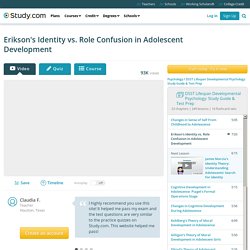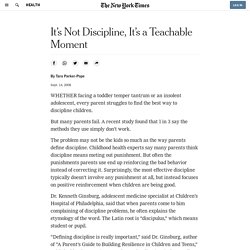

With exposures to external factors being a potential influence to their behavior, let’s explore how parents too can be of influence by means reinforcement and punishment. Formal operational stage - Intro to Psychology. Erikson's Identity vs. Role Confusion in Adolescent Development - Video & Lesson Transcript. Identity vs.

Role Confusion Remember Chaya? She's rebelling against her parents, changing before their very eyes. She's resisting their expectations of her and trying out new and different aspects of herself. Chaya is displaying the adolescent psychosocial crisis that will either lead her to identity, or knowing who she is and what she believes, or to role confusion, or not being sure of who she is or what she believes.
Learning: Negative Reinforcement vs. Punishment. Parenting Teens: When It Comes To Learning, Positive Reinforcement Trumps Punishment. Teens generally aren’t afraid to defy authority.

Generations of parents know this, having tried different strategies for getting their adolescents to do what they ask — often in attempts to keep them safe and help pave a path toward success. Now, a new study shows that rewards, rather than punishments, could be the way to get them to cooperate. Researchers at the University College London asked 18 volunteers aged 12 to 17 and 20 volunteers aged 18 to 32 to complete both a learning task and post-learning task in which they chose between abstract symbols, each associated with a fixed chance of reward, punishment, or no outcome.
As the trial progressed, participants learned which symbols were likely to lead to each result and adjusted their choices accordingly. Adults and teens alike proved equally capable of learning to be motivated by rewards, but the adults learned to avoid symbols associated with punishment while the adolescents did not. It’s Not Discipline, It’s a Teachable Moment.
WHETHER facing a toddler temper tantrum or an insolent adolescent, every parent struggles to find the best way to discipline children.

But many parents fail. A recent study found that 1 in 3 say the methods they use simply don’t work. The problem may not be the kids so much as the way parents define discipline. Childhood health experts say many parents think discipline means meting out punishment. But often the punishments parents use end up reinforcing the bad behavior instead of correcting it. Parenting teens with love and logic.